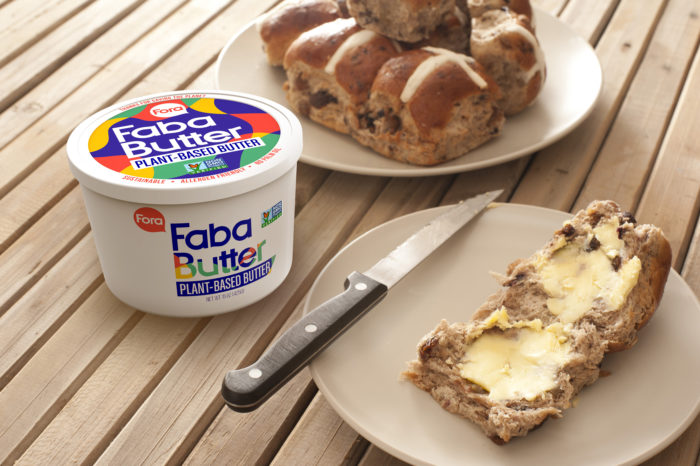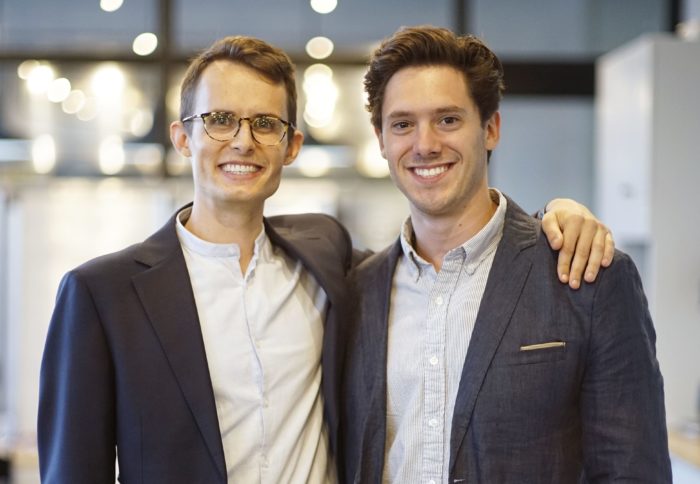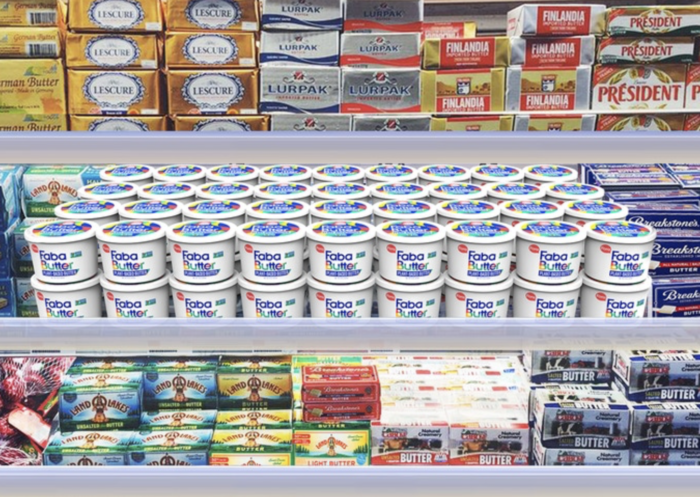Can You Believe This Startup’s Planet-friendly Butter?
FabaButter, a vegan spread created by a pair of Brooklyn-based millennials, is headed toward the marketplace with good reviews
The founders hope to have their non-dairy spread on grocery-store shelves by summer (Photos courtesy of Fora Foods)
FabaButter isn’t butter in the traditional sense, but you wouldn’t know it. The non-dairy, all-vegan spread tastes as velvety as the inside of a French eclair. Its creamy consistency is created with a base of coconut oil, sunflower oil and aquafaba, the liquid left over after cooking chickpeas or other legumes.
That’s not the only thing unusual about this Brooklyn startup product. Its launch is being financed by a Kickstarter campaign that has already exceeded its goal of raising $15,000, which will fund production of the first retail batch 10,000 lbs. of the novel spread.
But does the world need another competitor in a field full of butter substitutes, including Earth Balance and I Can’t Believe It’s Not Butter? “The buttery spreads on the market are processed, not sustainable and don’t hold their weight compared to FabaButter,” says Andrew McClure, CFO and co-founder of the startup, Fora Foods, “which is why it’s important for people to try it so that they know FabaButter is the real deal.”
Fora, which launched in January 2017, is the creation of two pals who attended the University of Michigan together: McClure and co-founder Aidan Altman, the startup’s CEO. Altman had previously launched Spice Foods, a maker of exotically flavored snacks, while McClure had been an investment banker focusing on the food industry.

Co-founders Andrew McClure, left, and Aidan Altman both attended the University of Michigan
When they both made the transition to a plant-based diet, they realized one particular substitute was missing. All the buttery spreads on the market “felt like the outdated, unmistakably artificial tub of margarine,” the duo says on their Kickstarter page. So the founders tinkered with batches in search of a better product until they hit on their current recipe, which has won effusive blurbs from top-flight chefs. “Absolutely love what you guys are doing. Really impressive stuff,” declared Scott Winegrad, executive chef for Matthew Kenney Cuisine, a vegan-oriented California company.
Not unlike tech startups, food companies have an ability to scale dramatically if they break through to a mass audience, as demonstrated by the likes of Chobani yogurt, which grew from five employees to 2,000 in a little over a decade. “This is an exciting time in specialty food,” says Denise Purcell, head of content with the Specialty Food Association, a trade group. “We’re seeing innovation everywhere, from specific ingredients to flavor profiles. There are new spins on classics as well as brand-new categories emerging.”
Altman and McClure officially debuted their product in February at the SFA’s Winter Fancy Food Show in San Francisco, where they joined the likes of Beyond Meat and Impossible Foods, which make meat-like and cheese-like products in the vegan space. “We decided to go vegan because we want to create a more sustainable food model over factory farming,” Altman told The Bridge. Compared with meat and dairy products, plant-based foods require less energy and other resources to produce. “The only way we can convince people to adopt this ideology we’re trying to put forward is if the product actually tastes great and that’s what we did with our butter,” he says.
In fact, one of FabaButter’s key ingredients is sourced from leftovers. The aquafaba is obtained from hummus makers, “who would usually pour it down the drain,” the company says. “Our product is not only easy but also cheap to produce so we can sell it at a logical price point and grow quickly,” said Altman. The growth potential stems from the increasing ranks of consumers turning to plant-based diets; an estimated 30 million Americans have at least dabbled in vegetarianism or veganism, according to a study by Faunalytics.

The company’s dream, visualized: shelf space in major food stores, where competition is fierce
While the aquafaba is not the biggest ingredient by volume in the new product, the founders emphasize it because it’s pivotal to bringing the ingredients together. “Aquafaba has been our magical tool to allow our oils and fats to blend together to get a really creamy, delicious, dairy-life product,” Altman told FoodNavigator-USA, a trade publication.
Brand recognition is one of the biggest challenges facing small food startups, according to Patrick Nycz, founding president of NewPoint Marketing. “Many startups don’t understand how to sell into retail, and food marketing is incredibly competitive,” says Nycz. “New food products have to displace another item to get on the grocery store shelves and it’s usually an established food brand.”
To help gain recognition, the founders have hit the streets. Earlier this month, they set up a popcorn stand at the Pine Box Rock Shop, a vegan bar in Bushwick, where they served up bags of popcorn with FabaButter on top. “It’s our demographic,” said McClure while serving popcorn to customers. “This is a fun way for us to raise awareness without actually having a product or packaging yet. We can still showcase the functionality of our products using popcorn. It’s a tasty snack.”
The two founders had been based in Chicago before moving to Brooklyn to launch their new venture. “Young people here have a certain outlook on the world,” said Altman. “That’s why we moved to Brooklyn, because this is where the action is happening in the vegan world.” Their local base of operations is at Pilotworks, the culinary incubator and commercial kitchen in a converted Pfizer factory on Flushing Avenue.
One other challenge the founders may face is pushback from the dairy industry because of their brand’s use of the word butter, which the U.S. Department of Agriculture defines as a product that contains at least 80% butterfat. In the past, such labeling has drawn challenges from competitors. But the partners think their bold use of the phrase “plant-based butter” on the label will help fend off complaints. In the end, Altman says, the partners hope that big food companies will see the value in their product and someday try to buy their company rather than bring a lawsuit.
But first they have to prove themselves in the marketplace. Given their special blend of veganism, sustainability and flavor, they may have a shot. “The tighter the niche, the more likely a new food product will be successful,” said marketing expert Nycz, author of Moving Your Brand Up the Food Chain. “Even the organic label is now losing some of its polish because the organic space is saturated. There’s a lot of product on the shelves that is organic, gluten-free or Paleo, which is no longer specialized enough.”
The next step for the founders is to send samples to their hundreds of backers on Kickstarter, whose advice they’ll consider while fine-tuning the product. Says Altman: “We want to get that back to all of the people who funded our campaign so that they can try it, give us their feedback then get it on grocery shelves by the summer.”










